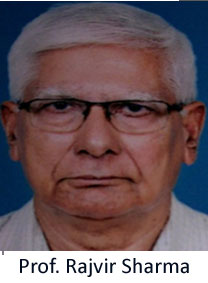 Gujarat Assembly elections results 2017 have been interpreted by a number of political analysts in different ways. Some of them may be taken here as examples to understand the electoral outcome there. In the beginning, one opinion led by the Congress and some section of media termed it (a) revival of Congress party and the maturing up of its president, Rahul Gandhi and (b) a related argument that it’s a moral victory of the Congress and a technical/numerical victory of the BJP. On closer examination, these arguments do well to booster the morale of Congress workers and the party, if they were confined only to the Congress brass.
Gujarat Assembly elections results 2017 have been interpreted by a number of political analysts in different ways. Some of them may be taken here as examples to understand the electoral outcome there. In the beginning, one opinion led by the Congress and some section of media termed it (a) revival of Congress party and the maturing up of its president, Rahul Gandhi and (b) a related argument that it’s a moral victory of the Congress and a technical/numerical victory of the BJP. On closer examination, these arguments do well to booster the morale of Congress workers and the party, if they were confined only to the Congress brass.
Rahul Gandhi, in the backdrop of his continuous electoral failures one after the other can be justified to draw satisfaction in this defeat in an attempt to win approval of his leadership within his party and outside with the opposition led mainly by the regional satraps. But one fails to appreciate the idea of a moral win over the BJP especially when one faces the fact of 49.1 percent electorate reposing faith in the ruling party and give it a majority in the Assembly to form the government again even when there was a ferocious use of caste and creed by the Congress.
Even then difference between the support base of the two parties is around 8 percent which is by no means a small one, much above the media projections of 3%( 46 vs 43). This is so irrespective of the promises made by the Congress of opening up the treasury for the real and assumed distressed sections, the concocted figures of unemployed youth who were promised unemployment allowance of fourthousand rupees per month, the’ disastrous’ impact of demonetization and the GST on the poor, small and medium traders and businessmen, the castes that were opponents to each other making an alliance to defeat Modi, not the BJP in Gujarat.
So one may be right in arriving at the opposite conclusions to what has been assigned so far to Congress moral victory. These may be attached as (1) the politics of opportunism is not very much liked by the cognitive voter of the day; (2)criticism of Policy reforms for a new India is not getting approval of the electorate;(3)the party/ies trying to bring back Politics of despondency are unacceptable to the people;(4) Abusive political discourse is taken as not only an act of frustration but also as condemnable act;(5) Congress is yet to travel a long distance to win the trust of the people more so in the light of corruption and appeasement;(6) developmental political discourse is entering deep into the minds of the makers of political choice and last but not the least the politics of double standards on secularism, social justice and nationalism and patriotism adopted by the opposition parties led by the Congress have cost them dearly and will continue to be so even more than being corrupt. Congress raised in these elections the issues that could be valid in 2019, not in 2017.
This does not mean that nothing has changed with reference to Rahul Gandhi. Frankly speaking he was more subdued and sober in the delivery of his speech and so was able to reduce the rate of disapproval of his standing as a leader.
The other message that Congress has sent to the BJP is that they would provoke, promote and prompt despair among the vulnerable sections like farmers, the Dalits, the Muslims and the youth and may also plant proxies like it seems to have done in Gujarat in Hardik Patel, Jignesh Mevani and Alpesh Thakore to start agitations to be encashed later in the upcoming elections in 2018 and the 2019 general elections.
The second message for BJP is that it will have to see the schemes, policies and programs to be turned into reality so as to retain the confidence of those for whom they were formed like the youth, the farmers and the women.In short the Gaon, Garib, Kisan alongwith the industry, business and tradeshould form the composite whole for attention The reforms are welcome but with a proper political communication so as to make them appreciated by the common man. Otherwise, BJP shall be committing the same mistake minus corruption that was committed by the Congress, that is, the schemes, programmes and policies may suffer a risk of becoming mere slogans as before the BJP came to power. Forthat not to happen it should use its wide and strong organizational network for feedback and also for translating promises into action and achievement.
The party leaders including the ministers both at the state and central level should be more accessible to the workers even if he/she is a Pradesh level committee member without the PS asking him the purpose of the meeting. Let us see
(The writer is Senior Consultant, School of Social Sciences, IGNOU, New Delhi)